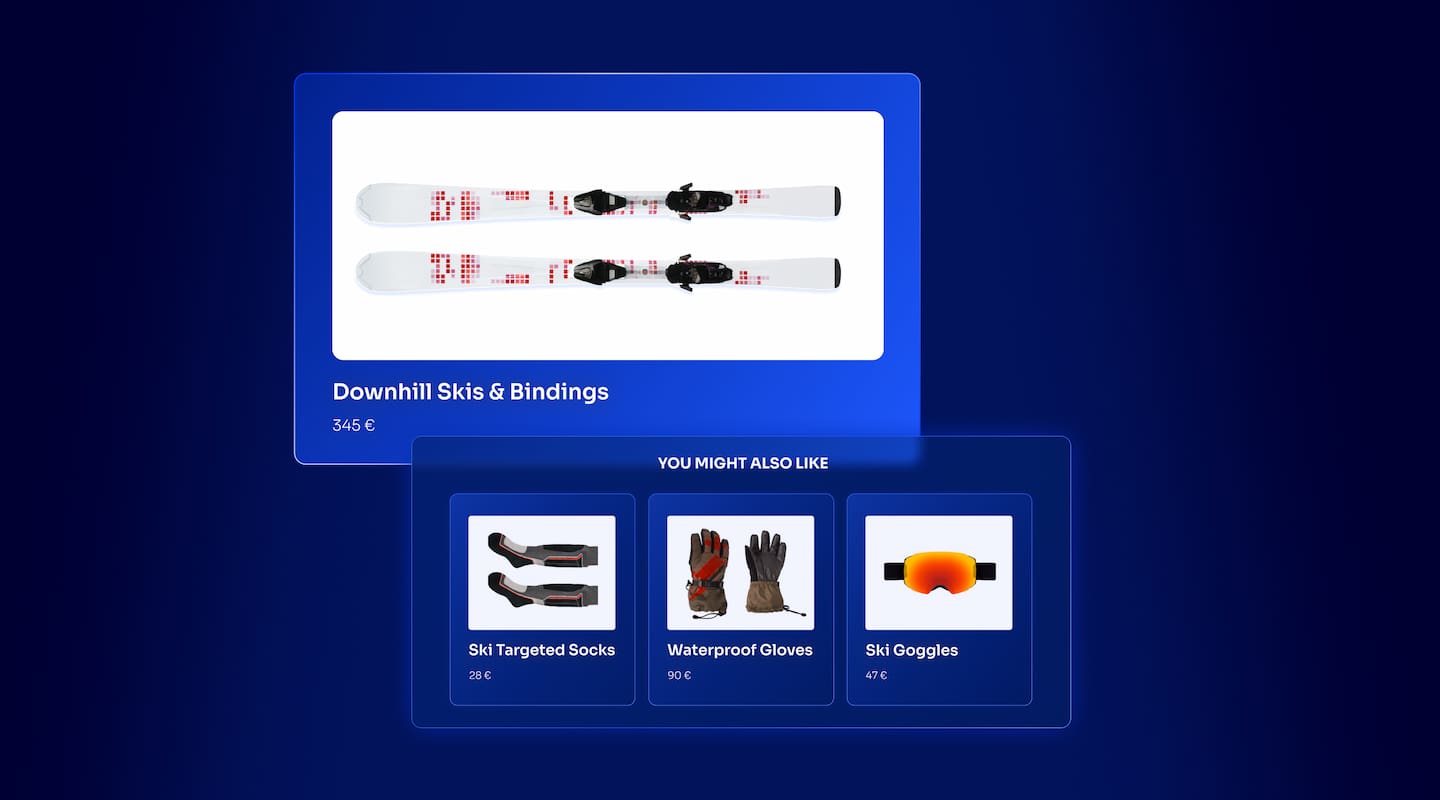Add InstantSearch and Autocomplete to your search experience in just 5 minutes
A good starting point for building a comprehensive search experience is a straightforward app template. When crafting your application’s ...
Senior Product Manager


A good starting point for building a comprehensive search experience is a straightforward app template. When crafting your application’s ...
Senior Product Manager

The inviting ecommerce website template that balances bright colors with plenty of white space. The stylized fonts for the headers ...
Search and Discovery writer

Imagine an online shopping experience designed to reflect your unique consumer needs and preferences — a digital world shaped completely around ...
Senior Digital Marketing Manager, SEO

Winter is here for those in the northern hemisphere, with thoughts drifting toward cozy blankets and mulled wine. But before ...
Sr. Developer Relations Engineer

What if there were a way to persuade shoppers who find your ecommerce site, ultimately making it to a product ...
Senior Digital Marketing Manager, SEO

This year a bunch of our engineers from our Sydney office attended GopherCon AU at University of Technology, Sydney, in ...
David Howden &
James Kozianski

Second only to personalization, conversational commerce has been a hot topic of conversation (pun intended) amongst retailers for the better ...
Principal, Klein4Retail

Algolia’s Recommend complements site search and discovery. As customers browse or search your site, dynamic recommendations encourage customers to ...
Frontend Engineer

Winter is coming, along with a bunch of houseguests. You want to replace your battered old sofa — after all, the ...
Search and Discovery writer

Search is a very complex problem Search is a complex problem that is hard to customize to a particular use ...
Co-founder & former CTO at Algolia

2%. That’s the average conversion rate for an online store. Unless you’re performing at Amazon’s promoted products ...
Senior Digital Marketing Manager, SEO

What’s a vector database? And how different is it than a regular-old traditional relational database? If you’re ...
Search and Discovery writer

How do you measure the success of a new feature? How do you test the impact? There are different ways ...
Senior Software Engineer

Algolia's advanced search capabilities pair seamlessly with iOS or Android Apps when using FlutterFlow. App development and search design ...
Sr. Developer Relations Engineer

In the midst of the Black Friday shopping frenzy, Algolia soared to new heights, setting new records and delivering an ...
Chief Executive Officer and Board Member at Algolia

When was your last online shopping trip, and how did it go? For consumers, it’s becoming arguably tougher to ...
Senior Digital Marketing Manager, SEO

Have you put your blood, sweat, and tears into perfecting your online store, only to see your conversion rates stuck ...
Senior Digital Marketing Manager, SEO

“Hello, how can I help you today?” This has to be the most tired, but nevertheless tried-and-true ...
Search and Discovery writer
Federated search essentially runs a search query across multiple sites, applications, or data sources, and displays the results in a single or multi-column layout.
With a federated search interface, a media streaming platform could display a list of songs, artists, and podcasts, all coming from different data sources – with a single query. Ecommerce as well could benefit by displaying recommendations and different categories of products on different parts of the display.
In a website context, you could create a real time search application that cuts across multiple domains or subdomains. It’s as easy as adding a new domain or subdomain to the list of sites to include in a central index, then creating a few additional rules for how search should appear. For example, if you have a “parent” website and several “sister” websites, you may want the parent website to display results from all sites equally, but on a sister site it could favor results from that sister site.
For enterprise search, it could include different information sources such as intranets, databases, and other datasets. You could centralize your back-end data or execute the same query on different applications and datasets.
In all cases, federated search starts with a single query and returns diverse results from multiple datasources to help your users to pinpoint the information they need.
NSW.gov.au is the public face for the Australian state of New South Wales. Like other government agencies around the world, there’s a top-level government website plus dozens of other agency sites such as the department of treasury, ministry of health, department of industry, etc.
The team at NSW.gov.au found that visitors were often searching on questions around driver’s licenses, liquor licenses, moving, and other topics that were available on a sister agency site, ServiceNSW.

Drivers license renewal information is on ServiceNSW. NSW.gov.au offers federated search across both sites to provide a better user experience for site visitors.
To accommodate visitors, NSW.gov.au blended datasets from ServiceNSW — including web pages, PDF, and DOCX content —and delivered results alongside the parent website’s content.
Web searches on NSW.gov.au include results from both sites but relevance scoring and machine learning automatically improve results to favor certain keyword searches. Visitors that type in “rego” (short for driver’s license registration) on NSW.gov.au will get results from ServiceNSW.
Each site is being crawled independently and the data is consolidated into a federated search index; no additional connectors were needed. In another situation you may need to use our APIs and other developer resources to build a central index.
There are several considerations for determining exactly how to federate search data across sites. Here are just a few. If you want more information, take a look at our in-depth implementation of federated search.
Every site has its own goals and objectives. The content and audience can vary considerably from site to site, so it’s important to ensure that the right content is delivered for the right query.
You can configure rules to deliver results on one or more sites in many different ways. For example, you could organize by category, by filters on the front end, or even by your backend indexing processes and query executions. And these are just a few ways to think about it. Let’s look at each of them briefly.
Likely the search index will be some mixture of all the above. In other words, there are many different options for a federated search solution both at index and query time to deliver relevant information. Start with determining the goals and outcomes for visitors on each site and then you can determine exactly how to accomplish those goals with search.
Perhaps the biggest challenge of federating site search is indexing and managing radically different schema and site organization.
To manage for these differences, you can add rules to transform data as it’s being indexed. For example, you will want to store records and data, such as time/date, in a consistent format. You may also choose to transform content for the search index. One website may call it “Corona virus” and another might call it “ COVID-19,” so you’ll want to store an index that contains the synonym. This can also be handled through more advanced vector analysis to cluster the data as numeric topics.
Another consideration is duplication of content. Different sources of data may have the same type of content, e.g., /about or /company pages, so when someone is searching for information about the business, they could come across both. You’ll want to decide how to handle duplicate or very similar content.
Search filters help users narrow their search query to find exactly what they want. With federated search, you can create filters that cut across each site or which are specific to each domain.

Generally speaking, there are three different types of filters. These are not mutually exclusive; you can use one or all three if you wanted.
Whichever kind of filter(s) you choose, you’ll want to consider how they show up on each site. You can use the same filters on each site, or deliver filters contextually.
A brief note on analytics: if you’ve added federated searching across different sources, how do you know it’s working? Each site owner will want a view into site search performance on their site. Metrics such as click-through-rate (CTR), conversions, popular queries, and ineffective searches or no results should be monitored to ensure visitors are finding what they need.
Federated search can provide a better search experience for end-users, but it requires a good deal of planning to ensure the results match expectations on each site. It’s worth pointing out that federating search doesn’t mean that each site needs to use the same CMS or adhere to the exact same schema or metadata standards. As long as the search index can be standardized, it is easily possible to deliver great results.
Powered by Algolia Recommend